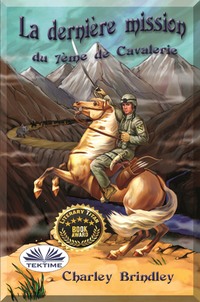
Полная версия
Dragonfly Vs Monarch
“Nope,” she said.
“I’m on my way to see what Hannibal has on today’s special. Wanna join me?”
She glanced down at the girl. “You hungry, Mama?”
The child nodded vigorously.
“Well, then, let’s go.”
Rigger stepped around the woman and picked up the girl before either of them could change their minds. She was light as a new kitten in his arms. Without hesitation, she put her arm around his neck and held on.
They threaded through the traffic, and he opened the door for the woman to precede him into the cafe.
The waitress told them the day’s special was liver, and Rigger noticed an expression of yuck on the child’s face. They ordered from the menu, and the waitress scurried away to the kitchen.
Rigger spoke to the girl. “What’s your name?”
“Rachel. I’m in the Bible, you know. This is Henry.” She held the grinning Barbie doll out to him.
“Hello, Henry.” He shook the outstretched plastic hand and felt the texture of her coral and rose pinafore—three doll-sizes too large. “I’m glad to meet you, and I must say, that’s a very pretty dress you’re wearing.”
Rachel stared at Henry, listening for a moment while adjusting the garment over an exposed shoulder. “She likes yours, too.”
Rigger studied the girl’s face. Rachel—Appearance – 10, Likability – 10, Attitude – 8, Usefulness – 2.
“Okay, here’s the deal,” the woman said, without warning.
Rigger and Rachel looked at her. So did Henry.
“We’ll clean your stupid apartment, but it’ll cost you fifty bucks.”
The girl and Henry looked at Rigger, expectant expressions on their faces.
He savored the moment, feeling some sort of perverse victory over the woman. Had he penetrated her icy facade and touched a warm current of femininity?
Street Woman; Appearance – 8, Likability – 1, Attitude – 0, Usefulness – 6.
“Sorry,” Rigger said, thinking he might persuade her to lighten her attitude. “My maid came back from vacation.”
“Let’s go, Rach.” She grabbed the girl’s arm, pushing her to the edge of booth.
“Wait.” He was no match for her. “Kidding. I was only kidding.” He reached for her wrist to keep them from leaving.
She glared at his hand, then wrenched away hers and settled back to her place. “Don’t fool with me, Rigger. I don’t play jokes.”
“All right, I’m sorry…” He stopped, confused for a moment. “I just wanted to see you smile.”
“I don’t do that either.”
He looked down to see Henry slowly turn her smiling face toward him.
“Okay,” he said. “No jokes, no smiles. I got it.”
The woman held her hand out to him, palm up.
“What?” he asked.
“Payment in advance.”
“Yeah, right…” He saw one eyebrow go up. “Okay, okay. Payment in advance. No jokes, no smiles.”
When his checkbook came out, she shook her head.
“American Express?” Rigger had reached a point where she was either going to take a joke or they were going to end this mercenary affair.
“Actually, I can do American Express.”
“Didn’t she say no jokes?” he asked Rachel, then looked the question at Henry. They both nodded.
“You have to add ten percent,” the woman said. “We do it at Punky’s Pawn Shop, over on Forty-third.”
“Seriously?”
“You don’t think a street woman can do business?”
“Oh, I think you’re a businesswoman all right. A very good businesswoman.”
He took some currency out of his wallet, riffling the new twenties to separate them. When he passed two twenties and a ten to her, he looked up to see the waitress glancing from the money to him to the woman.
She shrugged and asked, “Meatloaf?”
He made room for her to set the plate before him. She placed the chicken-fried steak in front of the woman, dropping it from a height that made an annoying clatter, but not quite enough to break the plate. Rachel got a hamburger with a side order of M&Ms, gently.
Henry sat down on the table, with her legs splayed out. She watched Rachel pick out three green candies. One went into Henry’s lap.
Rigger picked up his fork and stared at it as if he’d forgotten what he was going to do with it.
When did I tell her my name?
Chapter Three
Rigger’s apartment on Central Park East, facing Sheep Meadow.
Rigger roused himself from semi-paralysis and reached for his remote control to pause the Mozart. He hit the wrong button, bringing the TV to life.
A newscast blinked on. “…missing from her morning dance class.” A video of a hysterical mother pacing in front of an old redbrick building popped onto the screen. “No one, no one, especially Rudolf, my dumb-ass ex-husband, is supposed to pick up my daughter. I’ve told them and told them, he’s an imbecile, he’ll grab her and take off to Albuquerque or someplace. I bet he did it. I know the sonofa—”
The video of the woman abruptly changed to the contrite, chiseled face of a young news anchor with much-too-blue contact lenses. He squinted to read the teleprompter.
“However, the Tiny Tyke Academy’s spokesperson told our reporter that Samantha Ann Cramer wasn’t picked up at the school. They had no record of her arriving for her regular Wednesday morning bullet…” the man stopped and blinked at the camera. “Ah…uh…” he stammered, clearing his throat. “I mean ballet, her Wednesday morning ballet class. The mother insisted she had dropped off the four-year-old girl at nine a.m., as always, and watched her until she was inside the building. Meanwhile, police and child welfare authorities began—”
Rigger clicked off the TV when his doorbell chimed. He opened the door to see the familiar pea-jacket, Henry the Barbie doll, and sweet Irish eyes of Rachel.
“Come in, come in.” He stepped aside and waved them into his apartment, imitating the enthusiasm he wanted to feel.
When he closed the door, a fluffy ball of fur came bounding around a corner on the opposite side of the large living room. The puppy tripped on the red ribbon trailing from his neck, tumbled down the four carpeted steps, landed on his head, rolled end-over-end, and jumped to his feet. With tiny pink tongue flapping out the side of his mouth, he ran straight for the girl.
“L’phant!” she cried and ran behind the woman. He chased after her. Rachel dodged away. “L’phant, l’phant!” she squealed. “Save me.”
On the third time around, the woman grabbed the girl and held her up high. The puppy sat, panting, looking up at the child, still wanting to play.
“What the heck do you think you’re doing?” She didn’t give Rigger a chance to answer. “If I wanted her to have a dog, I’d buy her a dog. And it wouldn’t be a scruffy mutt like this one.” She shoved away the puppy with her foot.
Instead of being rebuffed, the dog took it as an invitation. He yipped happily, pouncing on the woman’s foot.
Rachel squirmed around to watch him.
“Who said it was for her?” Rigger asked.
“Oh, so it’s your dog?”
“Yes. I’ve been thinking for a long time I needed a watchdog.”
She blew out a breath through pursed lips and shoved away the puppy again. “You call that a watchdog?”
Rigger nodded.
“What’s his name, then?”
“I call him…um…” He glanced down at the playful tan and white half-spaniel. “Wolf. His name is Wolf.”
“Wolf?”
“Yes.”
“Well, if you’ll take your vicious watchdog named ‘Wolf’ and lock him in a closet or something, I’ll put Rachel down and get to work.”
“All right.” Rigger knelt down, swallowing his pain and moving as smoothly as a twenty-eight-year-old man should have been able to. He picked up the little dog. “Come on, pup. You can play in the bathroom for a while.”
Wolf—Appearance – 10, Likability -10, Attitude – 10, Usefulness – 0.
When he came back from putting the dog in the upstairs bathroom, he found Rachel standing in the middle of the living room, gazing at the artwork.
“Henry likes your pictures.” She turned the Barbie doll toward Rigger.
“Thank you, Henry.”
Rigger watched the woman remove her coat, drape it over a chair-back, and take a bibbed apron from her handbag. The apron still had a K-Mart price tag attached. She yanked off the tag, stuffed it into her pocket, slipped the neck strap over her head, and tied the apron strings in the back. Her apricot blouse contrasted nicely with the short tan skirt. It wasn’t the same outfit she wore before. Neither were her red peep-toe pumps.
“I’ll start in the kitchen. That’s always the worst.”
She didn’t wait for a response before walking away toward the formal dining room, which opened onto a large sunny kitchen. Her heels tapped across the hardwood floor that shimmered under a new coat of wax.
Rigger sat on the edge of his chair and looked at Rachel. “Well, what are we to do?”
“Henry Bouvier got to have operate.”
“Right now?”
“Yes, she’s dying.”
Rigger blinked. Building a dollhouse of cushions was what he’d expected. “Who’ll do the surgery?”
She looked at him, her brows knitted as well as a four-year-old can do that sort of thing.
“Operate,” he explained. “Who’s going to operate on her?”
“You are,” she said matter-of-factly, as if that should have been obvious. “But first she has to go to the bathroom.”
“Wolf is in the upstairs bathroom, but there’s another one, just down that hall.” He pointed toward a hallway to the right of the fireplace.
Rachel looked intently into Henry’s eyes. A small volume of two-way optical twittering went on for several seconds.
“Nope,” Rachel said, “has to be the upstairs bathroom.”
“Okay, but—”
The girl jumped up and ran toward the stairs, giving the kitchen a quick look.
“Hey,” Rigger said in a loud whisper.
She stopped, turning toward him, her foot on the second step.
“You forgot Henry.” He picked up the doll from where she lay at his feet.
Rachel ran back, grabbed Henry from his hand, and ran again for the stairs. With another glance toward the kitchen, she bounded up the steps.
Rigger smiled. Wolf—Appearance – 10, Likability – 10, Attitude – 10, Usefulness – 10. Perfect score.
Five minutes passed. He listened to the too-loud cleaning noises coming from the kitchen. Another five minutes, and Rigger began to wonder if Rachel was all right.
The woman came in from the kitchen, wiping her hands on a towel. “Where’s Rachel?”
“Um…in the bathroom.” Rigger looked at the stairway, then at the hall. “It’s down there.” He pointed toward the hall on the right side of the fireplace, where the downstairs bathroom was.
“Well, I probably need to do that next anyway.” She started for the hall.
“Wait!”
She stopped and stared at him.
“How did you do in the kitchen?” He went to inspect her work. She followed.
“Oh, man,” she mumbled loud enough for him to hear. “I hope this isn’t going to be one of those kind of jobs.”
After a cursory inspection of the kitchen, he glanced over the woman’s right shoulder, watching the stairway. “Looks pretty good.”
Her face took on a quizzical expression.
“I’m sorry,” he said. “I never asked your name.”
“Katrina. Katrina Raider.”
He held out his hand to her. She took it. Her hand was limp and cold in his. He let go.
“I’m Rigger.”
“Glad to meet you. How many bedrooms you got in this place?”
He regarded her, wondering why she asked that.
“It’s a professional question. I’ve got to clean them, you know.”
“Oh. Three.”
“You sleep in all of them?”
Rigger knew this wasn’t a joke. “Yes.” He saw Rachel tiptoeing down the stairs with Henry and smiled. “But not every night.” He waited until the girl took a seat on the hearth. “Come on, I’ll show you where they are.”
“Hi, Mama,” Katrina said as she and Rigger walked into the living room. “What’cha been doing?”
Rigger marveled at how sweet she was to the girl and contrasted that wonderful camaraderie he saw between them with the resentful, almost spiteful way Katrina talked to him. He envied a relationship so close, a mother and her little girl could call each other ‘Mama.’
“Thinking,” Rachel said.
“About what?”
“That house with a yard back grass you told about.”
“You mean grass back yard.”
“And monkey box.”
“Monkey bars.”
“And sand box.”
“Is that your gadget?” Katrina asked Rigger, nodding toward the mantel.
Rigger looked at it, then back at her. “Excuse me?”
“I said, what is that gadget?”
He walked to the fireplace and reached for the object. It was an electromechanical device suspended in a solid block of clear Lucite. It measured exactly three and a half inches square. He rotated it to catch the light, admiring the precision milled parts and tiny gold-etched circuit paths running zig-zags over the octagonal silver cover.
“It’s a triple-stabilized, self-calibrating thermionic gyroscope.”
“Oh.” She took it from his outstretched hand. “Sounds dangerous.”
“Only if you hold it too close to your heart.” He grinned at her.
She held it away from her body and looked at the other side. “What’s it for?”
“It’s part of the guidance system for cruise missiles.”
“Really?”
“Yes.” He expected some show of admiration, or at least approval.
“Then you’ve killed a lot of people.” She handed it back to him.
“Maybe I should’ve said it’s used in the guidance system of the Benedict Arnold also.” He put the gyroscope back on the mantel. “Or at least a variation of this one.”
“Traitor?” she said. “The anti-cruise-missile missile?”
He raised an eyebrow.
“I’m destitute, not illiterate. There was an exhaustive article in Newsweek last month about the Benedict Arnold, also known as The Traitor.”
Rigger had read the same article. During the second Gulf War, eight cruise missiles had gone astray, three of them killing civilians. The same problem had occurred in the Afghanistan war. It was during that war the Pentagon decided to proceed with development of the Benedict Arnold, which soon became called the Traitor. Its main purpose was to birddog the Navy’s Tomahawk cruise missiles. If one of them deviated from its course, even by as little as two degrees, the Traitor, which measured less than four feet in length, would instantly accelerate and destroy the errant cruise missile. Still an embarrassing mistake, having a highly developed weapon misbehave, but an airburst wasn’t nearly as deadly as having a confused cruiser fly through the window of a new bride’s wedding party. If the cruise missile performed as prescribed, then the Traitor would follow it into the target and add its own small contribution to the resultant explosion.
The second reason the guys in the Pentagon E-Ring wanted the Traitor developed was for use against enemy cruise missiles. This was, perhaps, the more important mission; a mission they knew would play a leading role in next war.
“Where’s your copy of the gyro for the Traitor?” she asked.
“They wouldn’t let me have one.” He didn’t bother to add that the new model was still too hush-hush even for the developer to have one in his own home. There was also the Dragonfly project, but he felt no desire to invite any more animosity from her; she was hostile enough.
“Now I’m impressed,” the woman said.
Rigger stared at her for a moment, thinking it would have felt better if she’d simply slapped his face. “I’ll show you the bedrooms.”
The words came out with a flinty edge, leaving a bitter taste in his mouth. He walked past her toward the hallway. He’d had enough of her surly attitude. After showing her the master bedroom downstairs and two additional bedrooms upstairs, he left her and returned to the living room to find the little girl.
“What’s your name?” Rachel asked.
“Rigger Entime.”
She held Henry in front of her face, with the doll facing Rigger. “I don’t think so,” she said in her deepest voice.
“Then what do you think my name is?”
“God.” She laid Henry on the carpet and began removing the doll’s clothing.
Rigger was taken aback. God? he thought. A god is a creator; not a destroyer. Obviously, she doesn’t realize who God is, or isn’t.
“Well, Rachel…” He was lost for a moment. “I’ve been mistaken for a lot of different people, but never anyone as magnanimous as He.”
She looked up at him, narrowing her eyes. She then crooked her pointer finger, motioning him to come closer.
He bent down.
“There’s something I have to tell you,” she whispered.
“What’s that?” he whispered, too.
“I don’t like big words.”
He straightened up. “Oh, sorry.”
“If you’re going to use big words, you have to talk to Kat…I mean Mama.” She went back to work on Henry. “She knows about big words.”
“Well, I’d much rather talk to you.” Rachel—Appearance – 10, Likability – 10, Attitude – 9, Usefulness – 7.
“I think it’s right here,” she said. Henry lay naked on the floor between them, smiling up at Rigger. Rachel pressed her fingertip to the doll’s tummy.
“What’s right there?”
The little girl jumped up and ran toward the hallway, then down the hall to where Katrina worked in the bathroom. A moment later, she came running back and fell to her knees at the doll’s side.
“Apengitus,” she said.
“Apengitus?” He stifled a chuckle. “You mean appendicitis?”
“Yes, and it’s got to come out.”
Rigger went to the kitchen and came back with an assortment of flatware and three linen napkins. He laid out forks, spoons, and a butter knife beside the ailing Barbie doll.
Rachel stared up at him, her eyes wide.
“It’s okay,” Rigger reassured her as he knelt on the floor. “Henry won’t feel a thing. Now, I’ll be the doctor, and you’ll be the nurse. When I ask for an instrument—”
She gave him a severe look.
“I mean tool. When I ask for a tool, you’ll hand me one of those.” He took one of the white linen napkins, folded it twice, and placed it over Henry’s face. “Now she’s out. We can get to work.” He flipped a second napkin into a triangle and tied it around his face, outlaw mask fashion. He placed the third napkin around Rachel’s face in the same manner, tying it in the back.
Rachel took her place on the opposite side of Henry, glancing from Rigger to the doll.
“Butter knife,” he said, holding out his hand to Rachel as he pressed an index finger to the doll’s stomach.
* * * * *Ten minutes later the operation was over, the offending appendix removed, and Henry still slept under the napkin.
Rachel and Rigger looked up to find Katrina staring at the two masked operators on either side of a naked doll, with a collection of silverware lying around. The doll’s face was still covered.
“We did it,” Rachel cried as she pulled down her mask and whipped the napkin off Henry’s face, then grabbed the doll. “Her belly’s fixed, and pretty soon she’ll be able to dance the ballet again. God said so.”
“Really?” Katrina said. “Ballet?”
For the first time, Rigger saw the tiniest smile soften her face.
Rachel dressed Henry as Rigger gathered up the flatware. He pulled down his mask as he got up, leaving it to hang around his neck. He walked toward the kitchen.
Katrina followed. “I’m finished, except for that one room upstairs. You’ll have to unlock the door if you want it cleaned.”
“No, it’s fine.” He dropped the silverware into the sink and thought about the Dragonfly behind that locked door.
“Guess you wanna inspect everything.”
Rigger faced her. “No, but I need your phone number.”
“Why?”
“You do such good work, I may want you again.”
As they walked back to the living room, he jotted down the phone number she gave him.
“Come on, Rach, we’ve got to go now.”
As soon as Rigger saw them out, he picked up the phone to make a call. When someone answered on the other end, he said, “Hi, Pugsley.” He listened for a moment. “Yeah, I’m fine.” He pulled the mask from around his neck to daub at his forehead, while the other man talked. “Listen,” Rigger interrupted him and glanced down at the notepad with Katrina’s phone number. “I’ve got a job for you.”
Chapter Four
Rigger didn’t die on that night, almost a year before, but something went wrong inside his body. In that bloody parking lot, he picked up some dreadful disease, perhaps something those two deviants left on the ground or in the air. Some alien pathogen that crept into him as he stood looking down at what was left of his life. A timed-release murder, relentlessly gnawing at his insides, destroying him from within.
He didn’t actually know where the disease came from, but in his seething rage at what those two had done to his life, he imagined they were killing him as well.
Ten months passed before he realized or even cared that something was wrong with him. His doctor put him through an exhaustive battery of tests, taking almost a week. The day he met Katrina and Rachel on the street was the day he’d received his death sentence. On previous visits to Dr. Ruth Macintyre’s clinic, her nurses had drawn blood and taken other samples from him. They sent them off to some laboratory for analysis. They ran EKGs, EEGs, CAT scans, stress tests—the works. Later came more blood and urine analysis. Then on that fateful day, his doctor delivered the dreaded news.
“Spongiform encephalopathy,” she told him.
After a half-hour of sitting beside him on her Sears couch, holding his hand, and going into great detail about current research, online support groups, and hope for patients in the future, she told him the hard truth.
“Rigger, in all my years of practice, I’ve never had to tell a patient there’s no hope. There’s always been an array of drugs, surgeries, and other treatments, radiation, chemotherapy for me to choose from. But this time, there’s nothing for me to cut out, there’s no tumor to bombard with radiation, and no infection to fight with drugs.” Dr. Macintyre let go of his hand and stood up to pace the floor before him. “It’s an insidious disease that worms its way into the cerebellum and bores tentacles into every corner of the brain. I’m sorry, Rigger; it’s inoperable, incurable. Go home and make peace with your God or get roaring drunk, it’s your choice.”
She gave him a yellow plastic bag filled with sample vials of Buprenorphine, a narcotic analgesic and powerful painkiller. She also wrote a prescription for morphine, refillable without limit, an anti-depressant, and Nexium and Tagamet to combat the side effects of the other medications.
Yes, he said in answer to her suggestion, he would get a second opinion, and a third. But he knew his days were numbered. He’d be dead in less than a year, according to Dr. Macintyre.
* * * * *The ringing of the phone jolted Rigger from his soft recliner. The sun was up, but the room cowered in darkness, as if fearful of the new day.
“Hey, Rig.” Pugsley’s voice came from the receiver. “That phone number you gave me to check on? It’s a home for battered women.”
“What?”
“Yeah, but you can’t talk to anyone. They have a series of voicemail boxes where you leave a message. If the woman wants to talk to you, she’ll call you back.”
“Pugsley, that’s all you got?”
“There ain’t nothing to get; it’s a dead end.”
“Even a dove leaves a trail through the mist, if one has the eye to see it.”
“Yeah, well, that may have worked for Longfellow and Hiawatha, but I gotta have feathers. You got Caller ID, right?”
“Yes.”
“Then call that place, leave a message for her, and my bet is, she’ll call back from a different number. That’s the trail of your little bird I need to see.”
* * * * *Rigger called Pugsley the next day. He’d dialed the number Katrina gave him and left a message, saying he wanted her to come back the following week to clean his apartment. She’d called back an hour later and told him she’d be there on Tuesday.
“Anonymous,” he told Pugsley over the phone as he looked at the display on his Caller ID.
“Great!”
“Great?” Rigger said. “What’s so great about anonymous?”
“Have you received any other calls?”
“No, she called just a minute ago.”
“Then pull the plug on your phone line. I’ll be right over.”
Ten minutes later when Pugsley knocked, Wolf beat Rigger to the door, yipping with puppy excitement. As soon as Pugsley stepped inside, Wolf attacked and gnawed a shoestring on a shiny cordovan Oxford.
Pugsley picked up the dog. “Now, this,” he said as he ruffled the blond and tan hair on the puppy’s head, “is a good idea.” The little dog squirmed and licked his hand. “You need something lively in this place.”









